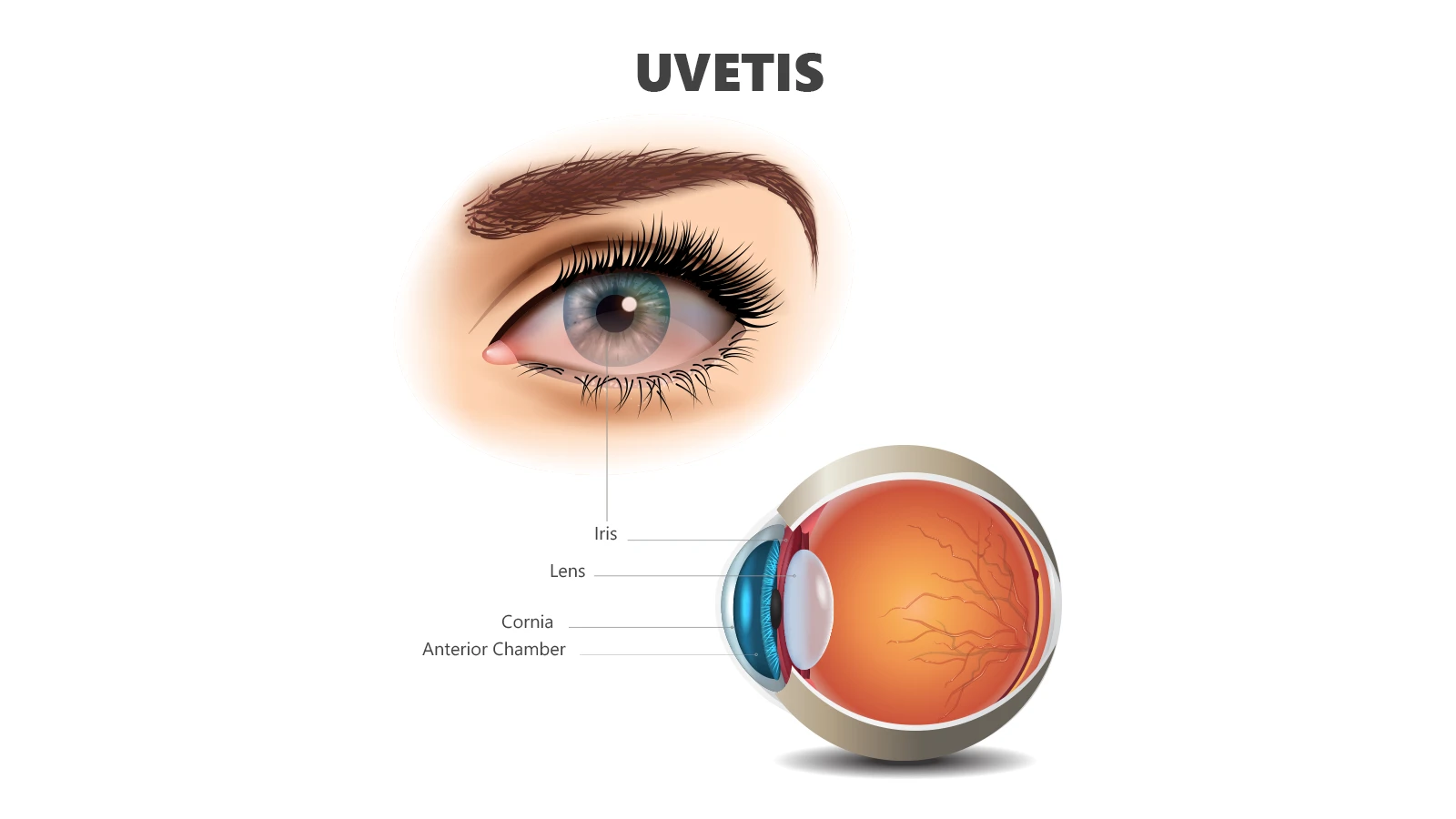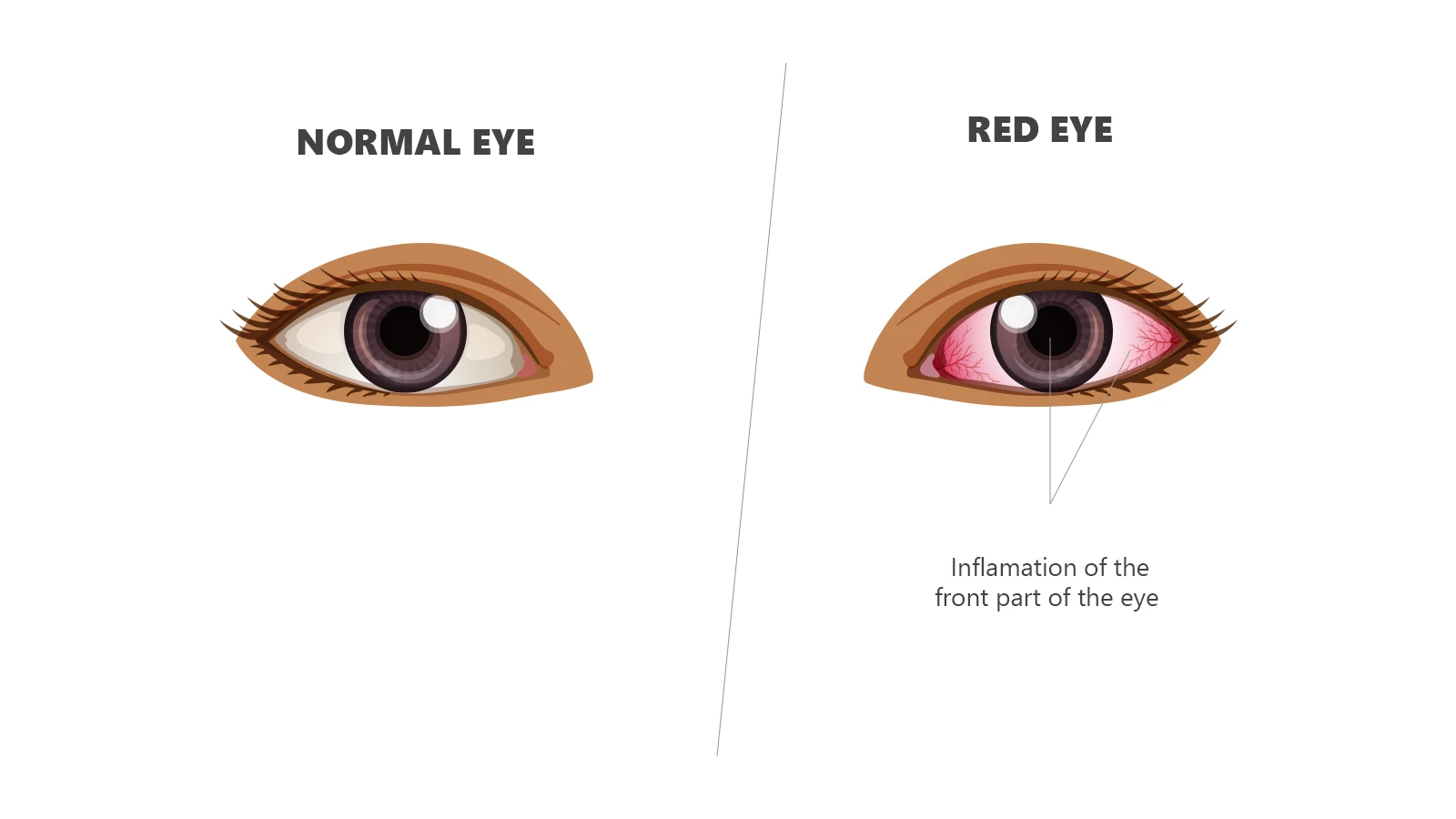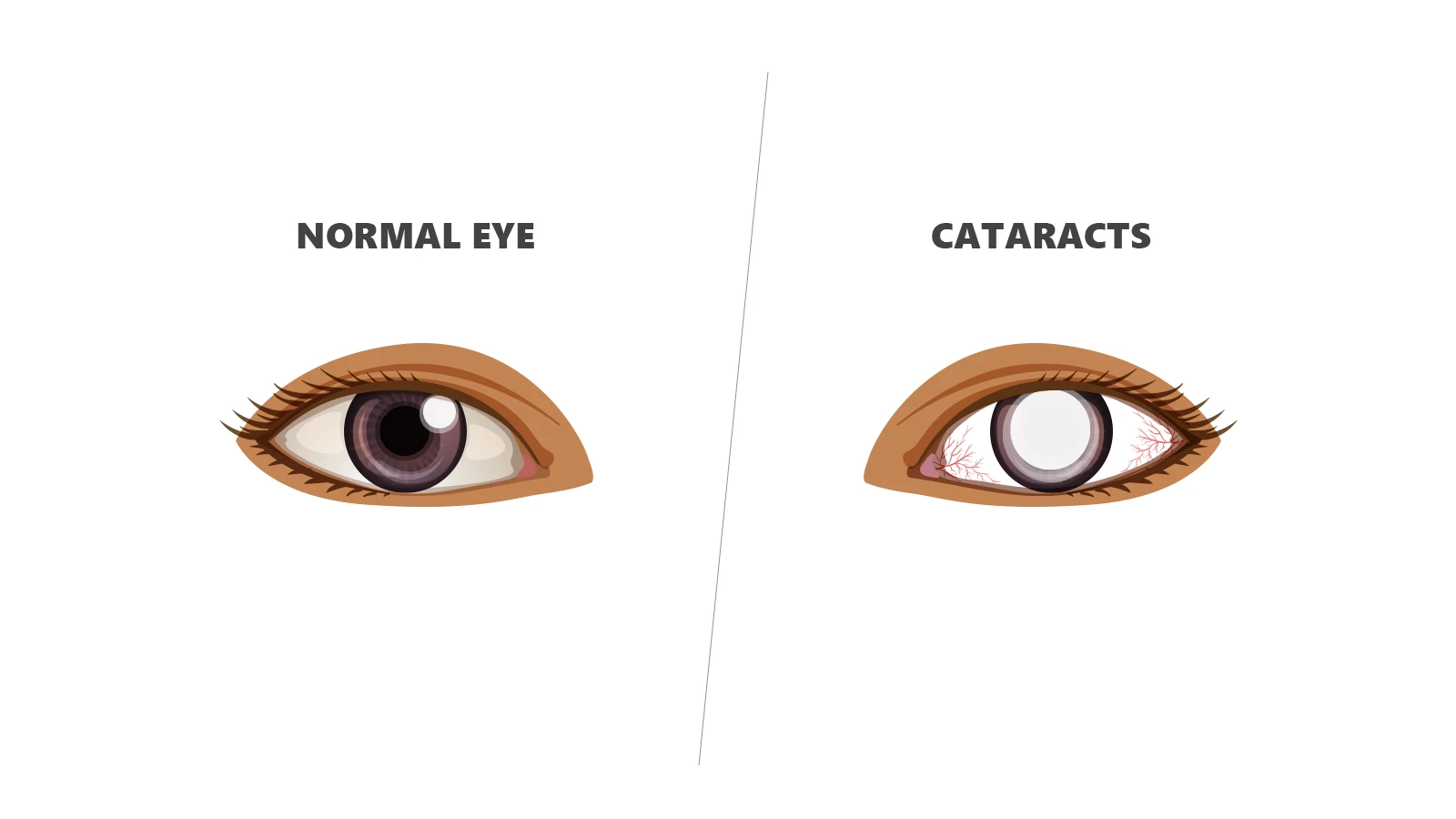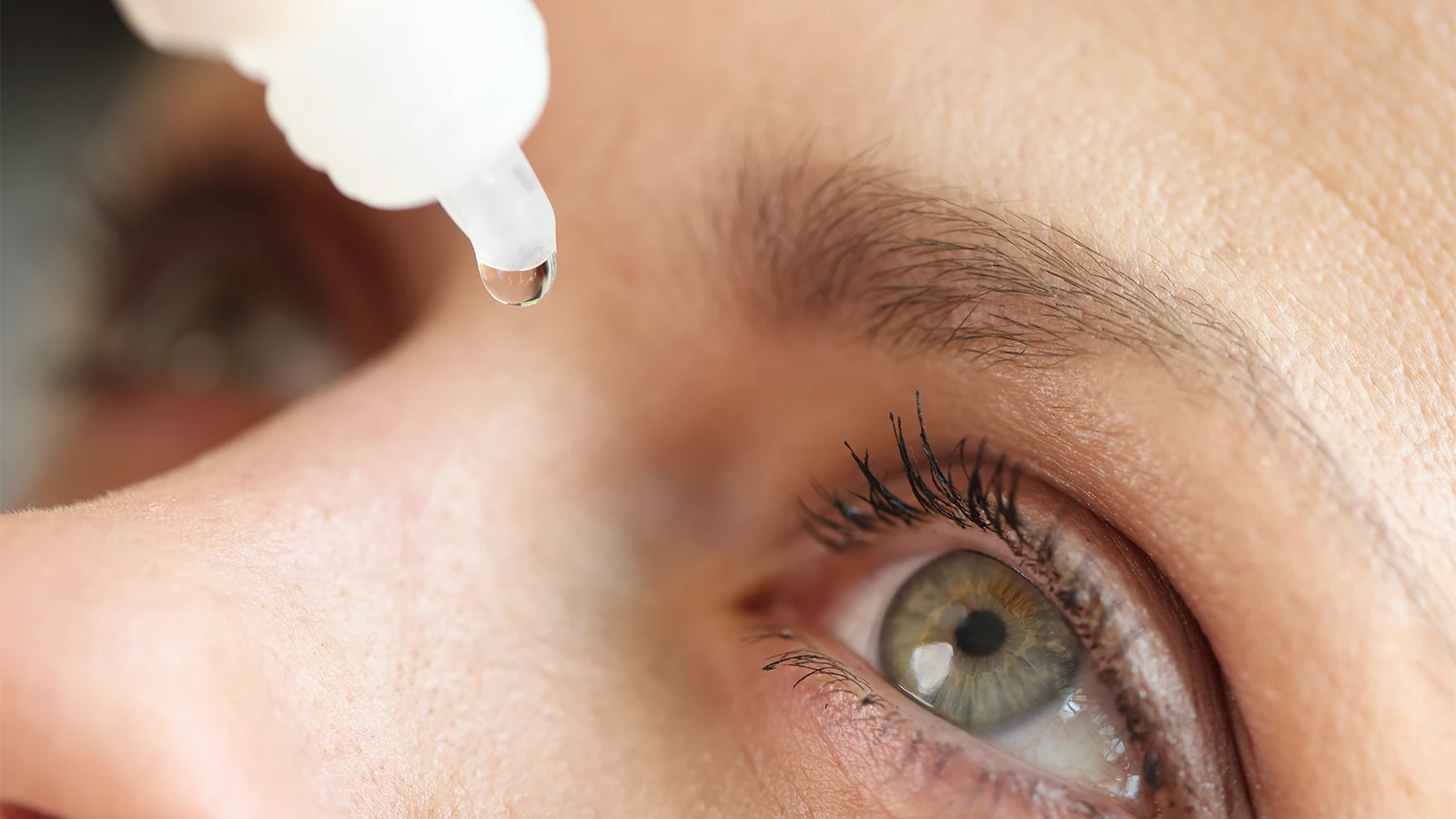Uveitis: All You Need to Know About This Rare Eye Disease

Content Manager
We often talk about common eye diseases, but it is equally important to know about the ones that are rare. One of the rarest eye diseases is Uveitis, which occurs because of inflammation in the eye. Around 2 to 5 people out of 10,000 people in the UK suffer from this disease.
Although it’s rare, it most commonly targets the population between 20 years to 60 years old. Did you know that uveitis is the fourth most common cause of vision loss among the working-age population all over the world? Thus, it’s important to understand the causes, symptoms and treatment of Uveitis. Let’s dig deeper and understand everything about this rare eye disease.
What is Uveitis?

Uveitis refers to the inflammation of the eye that can occur in one or both eyes. It’s a type of inflammatory disease that leads to the swelling of the middle layer of the eye, known as the uvea. The uvea consists of three major parts:
Iris: The coloured part of the eye.
The Ciliary Body: It is a ring-shaped muscle that helps your eyes focus by changing the size of the pupil and the shape of the crystalline lens.
Choroid: It supplies oxygen and nutrients to the outer retina.
This problem could be a result of an eye infection or injury. However, most of the time, the cause cannot be detected. If you work in a manufacturing plant, exposure to certain toxins and chemicals may also lead to uveitis.
The term Uveitis could be used when referring to inflammation in any part of the eye, including the iris and ciliary body. Uveitis doesn’t normally turn serious and could be treated with proper medical attention. But if you address the problem too late, you might have to deal with vision loss.
Types of Uveitis
Based on where the inflammation has occurred, uveitis can be categorised into four main types.
Anterior Uveitis: Used to describe inflammation in the iris. It is the most common yet the least serious type and may even occur in healthy individuals.
Intermediate Uveitis: When the inflammation happens specifically in the middle of the eye, it is known as iridocyclitis. It is mainly focused on the anterior vitreous, ciliary body and peripheral retina.
Posterior Uveitis: Also known as choroiditis, posterior uveitis is the inflammation in the back part of the uvea known as the choroid. It may affect the optic nerve and/or the retina. Thus, posterior uveitis could lead to vision loss in some cases.
Panuveitis: When the inflammation occurs in every layer of the uvea, it is termed pan-uveitis. Thus, a person with this eye disease will feel mixed symptoms from all the other types of uveitis.
Symptoms of Uveitis

Warning signs of uveitis could show up and become worse all of a sudden. The common symptoms of this disease are:
Eye pain
Eye redness
Blurred vision
Vision decline
Seeing floaters in your field of vision
If you experience any of these uveitis symptoms, schedule an exam with an eye care professional. The earlier you treat the problem, the better chance you’ll have to preserve your vision.
What Could Possibly Cause Uveitis?
In most cases, you won’t find an apparent underlying cause for this eye disease. It is associated with several diseases and syndromes, or might just be the result of your body’s natural response to infections. Uveitis can happen in people with autoimmune disorders such as:
Arthritis
Psoriasis
Rheumatoid arthritis
Ulcerative colitis
Ankylosing spondylitis
Reactive arthritis
Crohn’s disease
Multiple sclerosis
Sarcoidosis
Certain infections also put you at a higher risk of developing uveitis. Here they are:
Histoplasmosis
AIDS
Syphilis
Tuberculosis
Toxoplasmosis
Complications of Uveitis

When left untreated, uveitis may even lead to:
Retinal scarring
Retinal swelling
Cataracts
Retinal detachment
Permanent vision loss
People experiencing changes in their genes are also more likely to develop this problem. Moreover, cigarette smoking makes it even harder to control uveitis. Your uveitis could also turn severe if you use contact lenses or wear eye makeup before your eyes have healed.
Treatment of Uveitis

It’s important to seek the right treatment for uveitis as soon as you can. If you overlook this problem, it can lead to severe eye problems, including blindness. The treatment would aim to control inflammation, ease eye pain, prevent complications and restore lost visual acuity. The kind of treatment your doctor would prescribe depends on the type of uveitis you have, where it has occurred and whether it has affected both eyes.
If you have anterior uveitis, your doctor might recommend dark or tinted glasses to combat light sensitivity and eye pain. Corticosteroids are a type of steroid that blocks the production of a chemical that causes inflammation. They are used to treat posterior uveitis. You will either get it in the form of eye drops, shots or pills. If these medicines don’t work, your doctor will move you to another type of uveitis treatment method. Taking steroid pills will have some side effects on your body, including sleeplessness, weight gain, anxiety and mood swings.
However, if your uveitis has been caused due to an underlying infection, you will need antibiotics or other medications to treat that infection. Once you get rid of the infection, your uveitis will go away as well. But, if your uveitis is stubborn and keeps coming back even after several treatment procedures, surgeries like vitrectomy or implant surgery might help.
Final Thoughts
Keeping your eyes healthy is one of the most essential things to do. To get an update about your eye health for common or rare diseases like Uveitis, you should go for regular eye tests. We at Specscart offer free eye tests to everyone in our stores across Manchester. You can book online and visit our stores to get an updated condition of your eye health.
Caution: You may become style obsessed
Your way finder
2000+ Trendy Styles

Fashion Forward Sunnies




















































